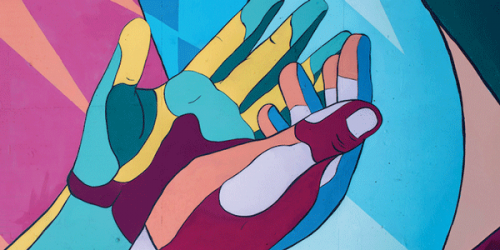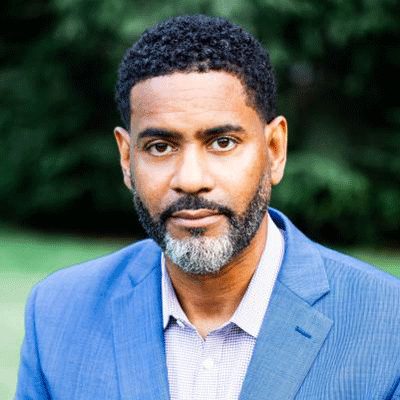The Rev. Dr. Otis Moss III gets Ecumenical Advocacy Days off to a rousing start
by Mike Ferguson | Presbyterian News Service

Ecumenical Advocacy Days began Monday and runs online through Wednesday. The theme this year is “Fierce Urgency: Advancing Civil & Human Rights.”
LOUISVILLE — Ecumenical Advocacy Days roared from 0 to 60 Monday in the short span of a sermon preached by one of the nation’s most gifted preachers, the Rev. Dr. Otis Moss III, senior pastor of Trinity United Church of Christ in Chicago.
EAD, a movement of the ecumenical Christian community — the Presbyterian Church (U.S.A.) among them — uses worship, theological reflection and opportunities for learning and witness to “strengthen our Christian voice and mobilize for advocacy on a wide variety of U.S. domestic and international policy issues,” according to the EAD website.
Moss used Luke 19:28-40 as his preaching text. That’s the same text many preachers used for their Palm Sunday sermon. Watch Moss’ sermon here.
As Luke tells it, Jesus has some specific instructions for his disciples, Moss noted: Go and find a donkey not yet ridden. Untie it and bring it to me.
“Find a colonized colt, a disenfranchised donkey, and bring it to me,” is the way Moss put it. “The colt was born into the world to serve someone else. It was not destined for greatness; it was doomed to be a beast of burden.”
This donkey the disciples found “had lived a life based on how others had defined him. This was a colonized colt. It was given a story by someone else. ‘Stay in your place, colt. Do not ask for rights. Don’t organize. Things will work out if you just stay in your place.’”
Jesus wanted this colonized colt as his main mode of transportation. “Jesus has interest in what everyone else has already dismissed,” Moss said. “You think I should ride a horse, but I’m not Caesar — I’m Christ.”
Because it was tied to a post, “the colt had limited ability to be able to see the fullness of the colt’s experience,” Moss said. “If he was untied, he might see a different sky, a different landscape.”
And if we take an honest look at how the nation functions, “it’s always tying up people and ideas, limiting them about what they can do,” Moss said. “Somebody wanted to maintain control of the colt, keep it in place and use it for profit to expand their capitalist interest.”
Just as this colt is set free, “those who represent the church are given an assignment to untie what has been tied up,” Moss said. “Which people and systems are tying people up? How can we untie them so they can blossom and exist to their full God-given potential?”

The Rev. Dr. Otis Moss III
“There are those who deeply fear you might get free,” Moss said. “If you are free, you might hear the words of Sojourner Truth, ‘Ain’t I a woman?’” Moss said they might just hear these words from Jesus as recorded in Matthew 25: “Truly I tell you, just as you did it to one of the least of these who are members of my family, you did it to me.”
“Here Jesus is sending his disciples to say, ‘Untie this colt.’ If it is untied, there might just be a colt revolt, or a stampede,” Moss said. “No longer will it be framed by exploitation.”
Jesus wants a colt that nobody’s ridden. In effect he tells the disciples, “I don’t want a domesticated donkey. I want an unridden colt.”
“In many ways, some of us have become domesticated donkeys,” Moss said. “We have been serving in our positions for so long and spouting the same rhetoric over and over that we don’t even believe we can make a transformation in our communities or in this nation.”
However, “there is a generation that’s an unridden colt, one not broken by society, that can still grow and change and see the world radically,” Moss said. “For the church to be able to thrive in this season, we can’t be limited by our donkeyesque focus on what liberation can or cannot be.”
Part of the church’s responsibility, Moss said, is “to make sure we don’t poison the next generation with our doctrine of domestication.”
“Jesus wanted a wild, untamed donkey, one who doesn’t know all the liturgy and can’t sing all the songs,” Moss said. Jesus wanted “one who raises questions about why do you do the things you do? We are always trying to place a lid on and domesticate the geniuses in our community who are not from our generation.”
Once each year at Trinity United Church of Christ — in a practice dating back to Moss’ predecessor, the Rev. Dr. Jeremiah A. Wright, Jr. — people who have participated in the church’s drug and alcohol recovery ministry come to church to “share their stories about the injuries they have caused, witnessed and received.” People then stand and applaud them.
Those who have been sober for years are given loud ovations. But the biggest response of all, Moss said, is for those who say they’ve been sober for 24 hours.
“The entire church erupts,” Moss said. “You see tears falling from people’s eyes. They hug them and say, ‘Just keep coming back. I’m praying for you.’” Moss said that years ago Wright had been told by God “to make sure you make space for those who have been tied up.”
“That is our call” as well, Moss said, “to make space for those who have been tied up.”
The Bible tells us that Jesus climbed atop the donkey and entered Jerusalem to enthusiastic shouts. The one who lifted Jesus the highest wasn’t Peter or Luke or Matthew, Moss said. “It was this unridden colt, this disenfranchised donkey, who now has a part in history” by bringing Jesus into Jerusalem.
“What shall you do this season?” Moss asked. “Shall you be a domesticated church, or will you be a liberating space where you are unafraid to untie the colt and set free the disenfranchised, blessing those who have been broken and standing as an ally and accomplice with those who have been bruised?”
“This is what our world needs: people who are unafraid to untie some things so they can be set free.”
The theme for the 2022 version of Ecumenical Advocacy Days is “Fierce Urgency: Advancing Civil & Human Rights.” EAD continues through Wednesday. Learn more here.
![]() You may freely reuse and distribute this article in its entirety for non-commercial purposes in any medium. Please include author attribution, photography credits, and a link to the original article. This work is licensed under a Creative Commons Attribution-NonCommercial-NoDeratives 4.0 International License.
You may freely reuse and distribute this article in its entirety for non-commercial purposes in any medium. Please include author attribution, photography credits, and a link to the original article. This work is licensed under a Creative Commons Attribution-NonCommercial-NoDeratives 4.0 International License.
Categories: Ecumenical & Interfaith, Peace & Justice
Tags: colonized colt, domesticated donkey, ecumenical advocacy days, ecumenical partners, fierce urgency: advancing civil & human rights, luke 19:28-40, matthew 25:31-46, rev. dr. otis moss iii, trinity united church of christ
Ministries: Compassion, Peace and Justice